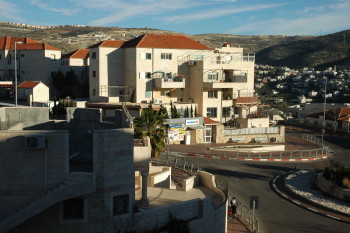Hitchhiking and supermarkets in the occupied territory
In my visit to Israel this past week, I spent almost all my time in the West Bank. In all, I have now either stayed in or visited a total of four West Bank settlements. In addition, while there I also did some sightseeing in Jerusalem and elsewhere. From this short experience I have gleaned some very fascinating facts, many of which are very surprising, though they shouldn’t be as they are facts that in many cases are fundamental to understanding the long-running and seemingly unsolvable Middle East conflict.
In the next few days I will post a series of short essays describing my experience and thoughts, with this essay being the first.
First and foremost, the assumption everyone makes about the West Bank and Israel is that it is a very dangerous place, especially for Jews. This assumption is entirely false. It is so false it is downright laughable.
The most telling illustration for this fact is that practically everyone who lives on the West Bank — both Israelis and Arabs — routinely hitchhikes. As you drive around, you will see scores of people standing by the side of the road, waving their arms looking for a ride. There is no fear of attack or violence. All people want to do is to find a way to get to where they are going as quickly as possible.
Granted, if you are Israeli you almost never accept a ride from an Arab (though it does happen). Similarly, Arabs rarely get picked up by Israelis (though also does happen). Nonetheless, the ease and nonchalance with which everyone hitchhikes illustrates quite forcefully how generally safe the country is. This fact was further reinforced by the nonchalance in which unworried parents let their kids wander about, even at night. In every West Bank settlement that I visited there were people out in the streets throughout the evening, including very young children. To put it bluntly, the streets were safe, much safer than in almost all American cities.
In fact, in Israel in general there is practically no violence or violent crime. The only violence that occurs in Israel is when a terrorist act takes place, which though relatively rare immediately gets trumpeted in all the newspapers and internet news sources worldwide. Imagine if every crime in Chicago, which take place far more frequently than terrorist acts in Israel, was given that kind of attention. We would all consider that city to be far more dangerous than Israel, and we would be right. It is far more dangerous.
This level of safety shouldn’t blind us to the problems that exist. Without doubt the Israeli and Arab communities remain estranged from each other. There is little or no contact, and in the few cases where the two communities do communicate, it is often done under the threat of violence by the more extreme elements of the Arab community.

Yet the two communities also do little to hurt each other and generally leave each other alone. For example, the picture on the right was taken from Beitar Illit, an orthodox West Bank settlement southwest of Jerusalem. Built on a hill, as are most Israeli settlements, on its south side and very close by, is a newly built Arab village, the homes of which can be seen in the valley on the right. Similarly, at another nearby West Bank settlement that I visited was a large supermarket servicing both Israelis and Arabs, with few problems.
In other words, these people are like everyone else in the world, ordinary human beings who simply want to have a family, raise their kids, and live their lives in peace. It is a shame that there are those in the Arab community who will not let them do it.
On Christmas Eve 1968 three Americans became the first humans to visit another world. What they did to celebrate was unexpected and profound, and will be remembered throughout all human history. Genesis: the Story of Apollo 8, Robert Zimmerman's classic history of humanity's first journey to another world, tells that story, and it is now available as both an ebook and an audiobook, both with a foreword by Valerie Anders and a new introduction by Robert Zimmerman.
The print edition can be purchased at Amazon or from any other book seller. If you want an autographed copy the price is $60 for the hardback and $45 for the paperback, plus $8 shipping for each. Go here for purchasing details. The ebook is available everywhere for $5.99 (before discount) at amazon, or direct from my ebook publisher, ebookit. If you buy it from ebookit you don't support the big tech companies and the author gets a bigger cut much sooner.
The audiobook is also available at all these vendors, and is also free with a 30-day trial membership to Audible.
"Not simply about one mission, [Genesis] is also the history of America's quest for the moon... Zimmerman has done a masterful job of tying disparate events together into a solid account of one of America's greatest human triumphs."--San Antonio Express-News


I have good friends who are Jewish and go to Israel all the time…they always tell me they feel safer there (considering they are both Jewish and American, as well as being strangers) than here in New York.
Interesting perspective – it would be almost unheard of for parents here to allow children out after dark. And hitchhiking here – even in the safest ‘burbs or whatever – is considered risky at best…